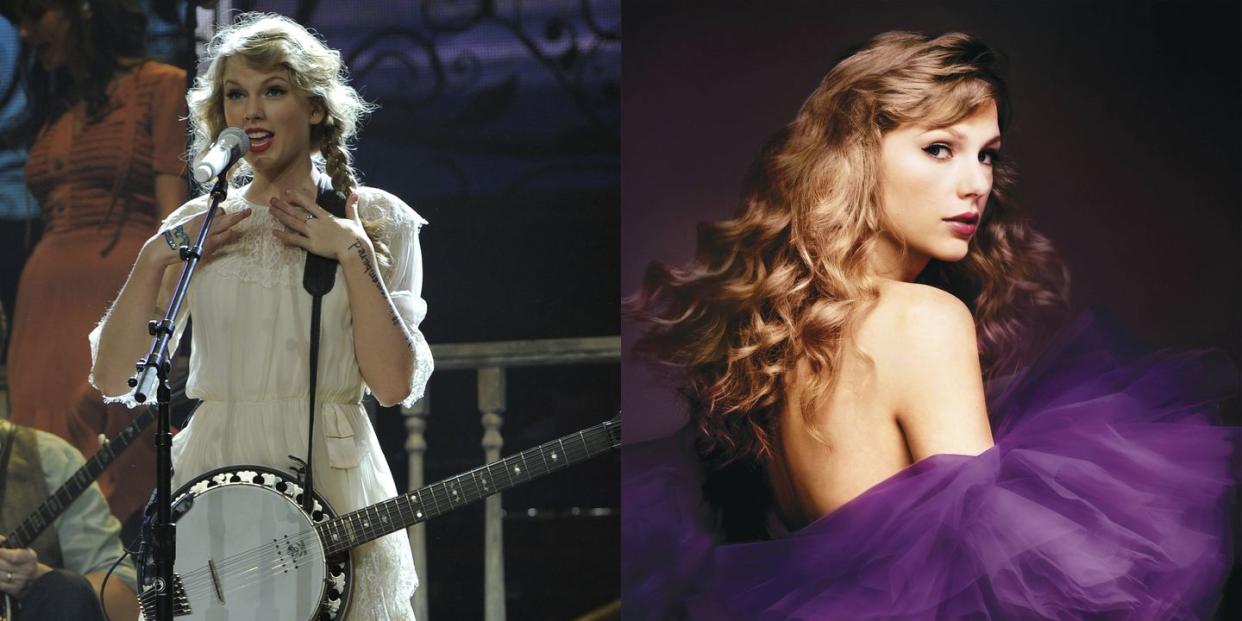Will Taylor Swift Change the “Better Than Revenge” Lyrics on ‘Speak Now (Taylor’s Version)’?

"Hearst Magazines and Yahoo may earn commission or revenue on some items through these links."
Quick Q for Swifties out there: Do you think Taylor Swift is going to rewrite her own lyrical history on Speak Now (Taylor’s Version)?
And follow-up Q: Do you want her to?
These are questions that have been weighing on many fans since Taylor first embarked on her project to rerecord her old albums, but now that the release of Speak Now (Taylor’s Version) is so very imminent, they’re becoming unavoidable thanks to “Better Than Revenge,” which is both undeniably a bit misogynistic and equally undeniably a straight-up BOP.
So, will Taylor change the “Better Than Revenge” lyrics for Speak Now (Taylor’s Version)? We obviously won’t *actually* know until the album drops on July 7, but here’s what you need to know about the controversial lyrics in question, how fans feel about them, and what Taylor has said (and done) in the past to address lyrics that might not age well.
Why are the “Better Than Revenge” lyrics controversial?
“Better Than Revenge” is, as the title suggests, basically a revenge anthem. It appeared on 2010’s Speak Now and is gloriously petty and vengeful but also has very clear problematic elements. The song sees Taylor addressing a romantic rival who stole a boyfriend from her and reminding said rival that even though she may have “won” that boyfriend’s heart, she shouldn’t get too comfortable because she’s also unleashed the Wrath of Taylor Swift, who does nothing “better than revenge.”
The song has been criticized over the years for being problematic/misogynistic thanks to lyrics like:
“She’s not a saint / And she’s not what you think / She’s an actress, whoa / She’s better known / For the things that she does / On the mattress, whoa.”
Who did Taylor Swift write “Better Than Revenge” About?
The prevailing theory about the song’s backstory is that it’s about actor Camilla Belle, who dated Joe Jonas immediately after Taylor did. The timelines of the relationships support the theory that a 19-year-old Taylor might have felt like Camilla “stole” Joe away from her:
July 2008: Joe and Taylor start dating.
September 18, 2008: The Jonas Brothers film the “Lovebug” music video—which Camilla also stars in.
October 2008: Joe and Taylor break up (in an infamously short phone conversation that Taylor was openly bitter about).
Also October 2008: Joe and Camilla begin what will end up being a seven-month relationship.
Do fans want Taylor Swift to change the “Better Than Revenge” lyrics?
Fans have been discussing and debating how Taylor will (/should) handle the issue and if that will mean changing the lyrics for “Better Than Revenge (Taylor’s Version)” for literally years at this point, and there are definitely plenty of people on both sides of the fence.
There are also a lot of fans who are self-described feminists and find the lyrics problematic on an intellectual level but are perfectly okay with the fact that they go into full feminism-on-pause mode when they hear the song and don’t want Taylor to change it.
And of course, there are also lots of fans who just want the world to leave Taylor alone and let her do whatever she wants with the song (which is also very valid):
Will Taylor Swift change the “Better Than Revenge” lyrics on Speak Now (Taylor’s Version)?
So, what will Taylor actually do? While she’s steered very clear of weighing in on “Better Than Revenge (Taylor’s Version)” at all, she has addressed the criticism of the song in the past. When asked about the song’s controversial lyrics in an interview with The Guardian in 2014, she told the interviewer:
“I was 18 when I wrote that. That’s the age you are when you think someone can actually take your boyfriend. Then you grow up and realize no one takes someone from you if they don’t want to leave.”
There’s also a precedent for Taylor changing old lyrics that don’t reflect her values. The original version of “Picture to Burn” from her self-titled debut album included the line, “That’s fine / I’ll tell mine you’re gay,” but Taylor rethought the lyric shortly after the album’s release and recorded a new version of the song that changed those lyrics to, “That’s fine / You won’t mind if I say.” The tweaked version is the one Taylor sent to radio stations when the song was released as a single, and it became the official version of the song on all copies of the album that were produced after the lyric change.
In a 2011 interview with MTV, she described the lyrics as “the kind of things you say when you’re hurt” and talked about how her way of expressing her feelings in her songs has evolved as she’s gotten older.
“I had this song called ‘Picture to Burn’ that’s talking about how ‘I hate your truck’ and ‘I hate that you ignored me,’ ‘I hate you,’” she explained at the time. “Now, the way that I would say that and the way that I would feel that kind of pain is a lot different.”
You Might Also Like